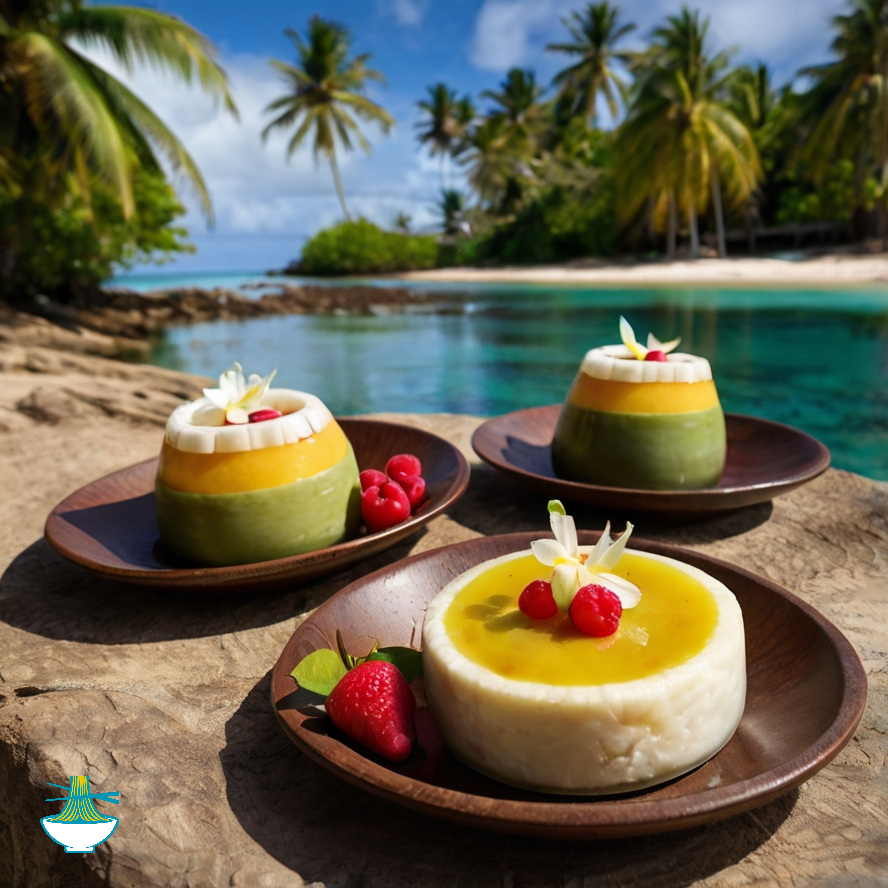Indulge in the tropical flavors of Kiribati with a delightful array of puddings that are as rich in tradition as they are in taste. Kiribati Pudding, a beloved dessert in this island nation, takes on various forms, all showcasing the lusciousness of coconut and the sweetness of local fruits. From creamy coconut milk to the vibrant hues of ripe papaya and bananas, each bite is a journey through the flavors of the Pacific.
Explore the textures and aromas of Kiribati's culinary heritage with our selection of puddings. Whether it's the velvety smoothness of Coconut Custard Pudding or the refreshing tang of Mango and Coconut Tapioca, there's a pudding to suit every palate. Dive into the tropical paradise of Kiribati with these exquisite treats, perfect for any occasion or simply to savor a taste of the islands.
Here's a recipe for Kiribati Pudding, showcasing various types made with coconut and local fruits:
Kiribati Pudding Medley
Ingredients:
- 2 cups coconut milk
- 1/2 cup sugar (adjust to taste)
- 1/2 cup tapioca pearls
- 1/2 cup diced ripe papaya
- 1/2 cup diced ripe mango
- 1/2 cup diced ripe banana
- 1/4 cup shredded coconut (for garnish)
- Pinch of salt
Instructions:
Prepare Tapioca Pearls:
1- Rinse tapioca pearls under cold water.
2- In a saucepan, bring 4 cups of water to a boil.
3- Add the tapioca pearls and reduce heat to medium.
4- Cook, stirring occasionally, for about 15-20 minutes or until the pearls are translucent and tender.
5- Drain and set aside.
Cooking Pudding:
1- In a separate saucepan, combine the coconut milk, sugar, and salt. Bring to a gentle simmer over medium heat, stirring until the sugar dissolves.
2- Add the cooked tapioca pearls to the coconut milk mixture. Stir well to combine.
3- Let it simmer for about 5 minutes, allowing the flavors to meld.
4- Remove from heat and let it cool slightly.
Assembling the Pudding:
1- In individual serving bowls or a large serving dish, layer the diced papaya, mango, and banana.
2- Pour the coconut and tapioca mixture over the fruits, distributing evenly.
3- Cover and refrigerate for at least 1-2 hours to chill and set.
Garnish and Serve:
1- Before serving, sprinkle the top with shredded coconut for a delightful crunch.
2- Serve chilled and enjoy the tropical flavors of Kiribati in every spoonful!
Variations:
- Coconut Custard Pudding: Instead of tapioca pearls, use cornstarch as a thickener to make a creamy coconut custard. Pour the custard over the fruits for a luxurious treat.
- Fruit Salad Pudding: Mix diced assorted fruits such as pineapple, guava, and passionfruit with the coconut milk and tapioca for a colorful and refreshing pudding.
- Banana Coconut Pudding: Layer sliced bananas with the coconut and tapioca mixture for a simpler yet delicious dessert.
Feel free to adjust the sweetness and fruit ratios according to your preference. These Kiribati-inspired puddings are not only delicious but also a celebration of the tropical bounty found in the Pacific islands. Enjoy!
Nutritional Values:
Here's an approximate nutritional breakdown for the main ingredients used in the Kiribati Pudding recipe:
2 Cups Coconut Milk:
- Calories: 800 kcal (varies by brand and fat content)
- Fat: 80 g
- Carbohydrates: 8 g
- Protein: 4 g
Benefits:
- Healthy Fats: Rich in medium-chain triglycerides (MCTs) which may support energy levels and metabolism.
- Nutrients: Provides vitamins (such as vitamin C and E) and minerals (such as potassium and magnesium).
1/2 Cup Sugar (Adjust to Taste):
- Calories: 400 kcal (varies by amount used)
- Fat: 0 g
- Carbohydrates: 100 g
- Protein: 0 g
Benefits:
- Sweetness: Adds sweetness to balance the flavors, though it's best consumed in moderation.
1/2 Cup Tapioca Pearls:
- Calories: 100 kcal
- Fat: 0 g
- Carbohydrates: 26 g
- Protein: 0 g
Benefits:
- Starch Source: Provides a chewy texture and is a source of carbohydrates for energy.
1/2 Cup Diced Ripe Papaya:
- Calories: 30 kcal
- Fat: 0 g
- Carbohydrates: 8 g
- Protein: 0.5 g
Benefits:
- Vitamins: Rich in vitamin C and vitamin A, supports immune health and skin health.
- Digestive Enzyme: Contains papain, which may aid in digestion.
1/2 Cup Diced Ripe Mango:
- Calories: 50 kcal
- Fat: 0 g
- Carbohydrates: 13 g
- Protein: 0.5 g
Benefits:
- Vitamins and Minerals: High in vitamin C, vitamin A, and antioxidants.
- Fiber: Supports digestive health.
1/2 Cup Diced Ripe Banana:
- Calories: 60 kcal
- Fat: 0 g
- Carbohydrates: ~15 g
- Protein: 0.5 g
Benefits:
- Potassium: Supports heart health and muscle function.
- Fiber: Aids in digestion and provides sustained energy.
1/4 Cup Shredded Coconut (For Garnish):
- Calories: 150 kcal
- Fat: 15 g
- Carbohydrates: 5 g
- Protein: 1 g
Benefits:
- Healthy Fats: Provides additional flavor and texture.
- Fiber: Adds to the dietary fiber content.
Pinch of Salt:
- Calories: 0 kcal
- Fat: 0 g
- Carbohydrates: 0 g
- Protein: 0 g
Benefits:Flavor Enhancer: Balances sweetness and enhances overall flavor.
These values are approximate and can vary based on specific brands and ingredients used. It's important to note that coconut milk and shredded coconut contribute significantly to the total fat content, while the fruits provide natural sugars and some fiber. Adjustments can be made to suit dietary needs or preferences.


Comments